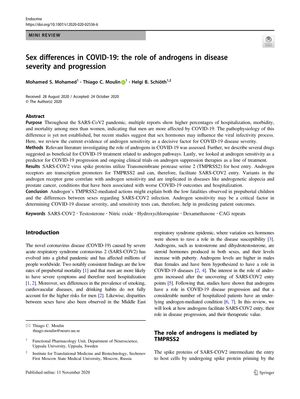TLDR Male hormones like testosterone may make COVID-19 worse, and testing for sensitivity to these hormones could help predict how severe a patient's symptoms might be. Treatments that reduce these hormones are being explored.
The mini-review "Sex differences in COVID-19: the role of androgens in disease severity and progression" suggests that androgens, like testosterone, may facilitate the entry of the SARS-CoV2 virus into host cells by promoting the transcription of Transmembrane protease serine 2 (TMPRSS2), a protein used by the virus for entry. Variants in the androgen receptor gene, associated with conditions like androgenetic alopecia and prostate cancer, have been linked to worse COVID-19 outcomes. The paper concludes that androgen sensitivity could be a key factor in determining COVID-19 disease severity, and sensitivity tests might help predict patient outcomes. Ongoing clinical trials are exploring androgen suppression therapies as a potential COVID-19 treatment, but these preliminary results should be interpreted with caution.
 119 citations
,
May 2020 in “Journal of The American Academy of Dermatology”
119 citations
,
May 2020 in “Journal of The American Academy of Dermatology” Most COVID-19 patients in hospitals have androgenetic alopecia, more in men, suggesting a link between androgen sensitivity and severe COVID-19 symptoms.
 123 citations
,
May 2020 in “Drug Development Research”
123 citations
,
May 2020 in “Drug Development Research” Men's sensitivity to male hormones might affect how severe COVID-19 gets for them.
 71 citations
,
April 2020 in “Journal of Cosmetic Dermatology”
71 citations
,
April 2020 in “Journal of Cosmetic Dermatology” Genetic differences may affect COVID-19 deaths; anti-androgens could be potential treatment.
 134 citations
,
April 2020 in “Journal of Cosmetic Dermatology”
134 citations
,
April 2020 in “Journal of Cosmetic Dermatology” Male pattern hair loss could hint at androgens affecting COVID-19 severity.
 195 citations
,
June 2005 in “American Journal of Human Genetics”
195 citations
,
June 2005 in “American Journal of Human Genetics” Genetic variation in the androgen receptor gene mainly causes early-onset hair loss, with maternal inheritance playing a key role.
 186 citations
,
July 1998 in “Journal of Cutaneous Medicine and Surgery”
186 citations
,
July 1998 in “Journal of Cutaneous Medicine and Surgery” Shorter CAG repeats may cause hair and skin issues, while longer ones may link to acne.
 71 citations
,
April 2020 in “Journal of Cosmetic Dermatology”
71 citations
,
April 2020 in “Journal of Cosmetic Dermatology” Genetic differences may affect COVID-19 deaths; anti-androgens could be potential treatment.
 47 citations
,
January 2021 in “Fertility and Sterility”
47 citations
,
January 2021 in “Fertility and Sterility” COVID-19 might affect male fertility, but more research is needed to understand the full impact.
 6 citations
,
December 2020 in “Dermatological reviews”
6 citations
,
December 2020 in “Dermatological reviews” COVID-19 may worsen with androgens; anti-androgen drugs could help.
16 citations
,
August 2021 in “Tumor Biology” TMPRSS2 helps viruses enter cells and protects the prostate from inflammation-related cancer.
50 citations
,
November 2021 in “Viruses” Spironolactone may help reduce COVID-19 severity in men by blocking harmful effects of certain hormones.








